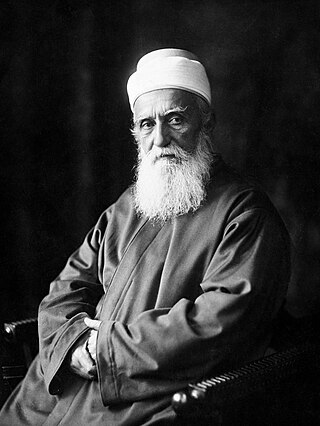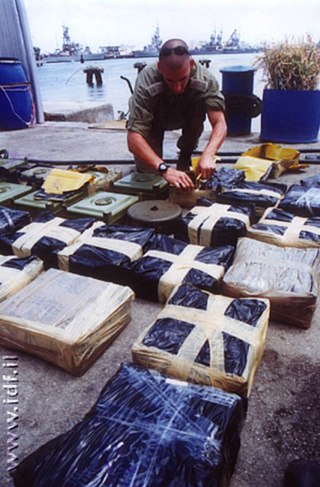
ʻAbdu'l-Bahá,born ʻAbbás,was the eldest son of Baháʼu'lláh, founder of the Bahá’íFaith who designated him to be his successor and head of the BaháʼíFaith from 1892 until 1921. ʻAbdu'l-Baháwas later cited as the last of three "central figures" of the religion,along with Baháʼu'lláh and the Báb,and his writings and authenticated talks are regarded as sources of Baháʼísacred literature.

Fatah,formally the Palestinian National Liberation Movement,is a Palestinian nationalist and social democratic political party. It is the largest faction of the confederated multi-party Palestine Liberation Organization (PLO) and the second-largest party in the Palestinian Legislative Council (PLC). Mahmoud Abbas,the President of the Palestinian Authority,is the chairman of Fatah.

ShoghíEffendi(;Persian:شوقیافندی;1 March 1897 –4 November 1957) was an Ottoman-born Iranian religious figure and the Guardian of the BaháʼíFaith from 1921 to 1957. As the grandson and successor of ʻAbdu'l-Bahá,he was responsible for creating a series of teaching plans that oversaw the expansion of the BaháʼíFaith to a number of new countries,and also translated many of the written works of crucial Baháʼíleaders. Upon his death in 1957,the Hands of the Cause,which included his Canadian wife Rúhíyyih Khánum,took on the role of overseeing the transfer of the religion's supreme legal authority to the Universal House of Justice,which has held elections every five years since 1963.

Yasser Arafat,also popularly known by his kunya Abu Ammar,was a Palestinian political leader. He was chairman of the Palestine Liberation Organization (PLO) from 1969 to 2004,President of the State of Palestine from 1989 to 2004 and President of the Palestinian Authority (PNA) from 1994 to 2004. Ideologically an Arab nationalist and a socialist,Arafat was a founding member of the Fatah political party,which he led from 1959 until 2004.

Jean Genet was a French novelist,playwright,poet,essayist,and political activist. In his early life he was a vagabond and petty criminal,but he later became a writer and playwright. His major works include the novels The Thief's Journal and Our Lady of the Flowers and the plays The Balcony,The Maids and The Screens.
Baháʼu'lláh was the founder of the BaháʼíFaith. He was born in 1817 to Khadíjih Khánum and MírzáBuzurg of Nur,a Persian nobleman,and went on to be a leader in the Bábímovement,and then established the BaháʼíFaith in 1863. Baháʼu'lláh's family consists of his three wives and the children of those wives.
The BaháʼíFaith was formed in the late 19th-century Middle East by Baháʼu'lláh,and teaches that an official line of succession of leadership is part of a divine covenant that assures unity and prevents schism. There are no major schisms in the BaháʼíFaith,and attempts to form alternative leadership have either become extinct with time or have remained in extremely small numbers that are shunned by the majority. The largest extant sect is related to Mason Remey's claim to leadership in 1960,which has continued with two or three groups numbering less than 200 collectively,mostly in the United States.
Afnán is a term in literature of the BaháʼíFaith referring to maternal relatives of the Báb,and is used as a surname by their descendants.

The Santorini was a fishing boat used for weapons-smuggling,which was captured in May 2001 by the Israeli Shayetet 13 Naval Commando Unit. This was the first ship caught in an attempt to smuggle weapons to Palestinian-controlled territories. In May 2002,three of the Santorini's crew members were convicted of attempting to smuggle weapons into the Gaza Strip.
Munib Jalal Shahid was Chairman of Hematology and Oncology at the Faculty of Medicine of the American University of Beirut. He built the hematology laboratory at the Faculty of Medicine,a development that increased research output significantly. The Dr. Munib Shahid Award is presented annually at the American University of Beirut to the fourth year medical student demonstrating the best performance in internal medicine and a mature character.
John Ebenezer Esslemont M.B.,Ch.B.,from Scotland,was a prominent British adherent of the BaháʼíFaith. Shoghi Effendi,Guardian of the BaháʼíFaith,posthumously named Esslemont a Hand of the Cause of God,one of the Disciples of ʻAbdu'l-Bahá,and one of the United Kingdom's three luminaries of the BaháʼíFaith. He was the author of one of the foremost introductory texts on the BaháʼíFaith and worked as a translator of Baháʼítexts near the end of his life. In addition to his work for the BaháʼíFaith,Esslemont was an accomplished physician,as well as a linguist,proficient in English,French,Spanish,German,Esperanto,and later Persian and Arabic. Dr. Esslemont died of tuberculosis in Palestine in 1925.
Serene Husseini Shahid was a teacher,writer,and scholar of Palestinian embroidery.

The General Union of Palestine Students is a Palestinian student organization. Created in the 1920's,it is generally considered one of the first Palestinian institutions. It was officially launched in Cairo in 1959 with chapters formed in universities all over the Arab world. Considered "the first Palestinian sectoral organization to re-emerge after the 1948 dispersal," the General Union of Palestine Students "came to play a leading role in Palestinian organizational life" and helped form a cohort of leaders that would play prominent roles later on in the Palestine Liberation Organization.
The BaháʼíFaith in Kazakhstan began during the policy of oppression of religion in the former Soviet Union. Before that time,Kazakhstan,as part of the Russian Empire,had indirect contact with the BaháʼíFaith as far back as 1847. Following the arrival of pioneers the community grew to be the largest religious community after Islam and Christianity,although only a minor percent of the national whole. By 1994 the National Spiritual Assembly of Kazakhstan was elected and the community had begun to multiply its efforts across various interests. The Association of Religion Data Archives estimated some 6,400 Baháʼís in 2005.
Opponents of the BaháʼíFaith have accused the faith's followers of committing various acts of political mischief,such as having a supposed "dual loyalty" and being secretly in the employ of foreign powers supposedly inimical to the interest of their home state. These accusations,together with others with a more theological bent,have been used to justify persecution of adherents of the BaháʼíFaith and the religion itself.
The BaháʼíFaith in England started with the earliest mentions of the predecessor of the BaháʼíFaith,the Báb,in The Times on 1 November 1845,only a little over a year after the Báb first stated his mission. Today there are Baháʼícommunities across the country from Carlisle to Cornwall.

The bilateral relations between the State of Palestine and Russia have a complex history,deeply interwoven with Russian and Soviet relations with the Israeli enterprise,Palestinian nationalism,and Third World national liberation movements. Between 1956 and 1990,Soviet–Palestinian relations were part of the then-ongoing Soviet–American confrontation.

MírzáMuḥammad Muṣṭafáal-Baghdádí (1837/8—1910) was a prominent Iraqi adherent of the Baháʼífaith and one of 19 Apostles of Baháʼu'lláh. Mustafáwas among the leading Baháʼís in Iraq until he moved to Beirut in the late 1870s,where he coordinated pilgrims going to see Baháʼu'lláh in ʻAkká,and later he was involved with the movement of the Báb's remains to ʻAkká.

The Palestinian keffiyeh is a distinctly patterned black-and-white keffiyeh.

Hanna Mikhail,nome de guerre Abu Omar,was a Palestinian scholar and a Fatah member who disappeared in 1976.











